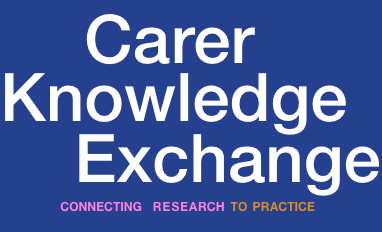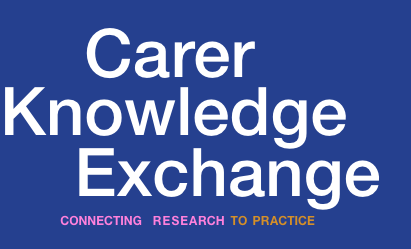Research Library
The Carer Knowledge Exchange Research Library is a collection of recent Australian publications and other resources that contain reliable research about family and friend carers. It is constantly being added to, and you can suggest research to be included here.
There are two main ways to use the Research Library. The first is to search using the fields below. The second is to browse by category lower down the page.
For help using the Research Library, click here.
Please also see our Frequently asked questions page.
The publications in this research library may contain references to sensitive issues and cause distress. If you or someone you are with is in immediate danger, please call 000. If you feel upset or are in distress, you can contact Lifeline, 24 hours a day, 7 days a week by phoning 13 11 14 or texting 0477 13 11 14. For other information on support for carers please visit our support for carers page.
-
Add your research
Is something important missing from the Research Library? Share your research or suggest research by another author using our submission form. For more information about how to create an account click here and for more information about how to upload a publication to the research library click here.
My Research
Your Results
Filter my Results
Use the ‘filter my results’ function to further refine your search results. If you would like to start a new search, please use the ‘search for a resource’ function above
Your search has returned 24 results
-
4.8.2017
Implementing a multi-modal support service model for the family caregivers of persons with age-related macular degeneration
Bamini Gopinath, Ashley Craig, Annette Kifley, Gerald Liew, Jaye Bloffwitch, Kim Van Vu, Nichole Joachim, Robert Cummins, Julie Heraghty, Timothy Broady, Alison Hayes, Paul Mitchell
This study investigated the experiences of individuals who care for persons with age-related macular degeneration and the need to provide tailored support to these carers.
-
30.11.2017
Availability and use of supportive practices for employees with a non-work informal caregiving role
Hugh Bainbridge, Timothy Broady
This study aimed to investigate the effects of practices that can help employees combine work with unpaid care for family members who are frail due to old age or who have a disability.
-
24.11.2020
Briefing 2: Working remotely can work for carers but multi-dimensional flexibility will even better meet their needs
Rachel Matheson, Priya Visvanathan, Sarah Judd-Lam, Paula Gleeson , University of Technology Sydney
This briefing explores how employers can provide flexible work arrangements to support carers' participation in paid employment, advocating for employers to acknowledge the importance of accommodating carers needs.
-
8.3.2021
Briefing 3: Flexible working is important, but employers need a broader workplace strategy for carers
Keith Townsend, Hugh Bainbridge, Rachel Matheson, Sarah Judd-Lam
This briefing provides insight into employment practices that that will help make balancing paid employment and caring more sustainable for carers.
-
1.4.2024
Informing strategies to prevent abuse, neglect, and exploitation of adults with disability and older people by carers
Timothy Broady, Ilan Katz, Sarah Judd-Lam, Catherine Thomson
This report discusses alleged abuse, neglect, and exploitation of adults with disability and older people by carers.
-
1.4.2024
Literature review on the abuse, neglect, and exploitation of adults with disability and older people by carers
Timothy Broady, Catherine Thomson, Ilan Katz, Sarah Judd-Lam
This literature review discusses the risk factors involved with neglect, abuse, and exploitation of older people and adults with disability.
-
18.10.2024
The importance of recognition
Myra Hamilton, Hugh Bainbridge, Marian Baird, Nate Zettna, Lukas Hofstätter , Sarah Judd-Lam, Kate O’Loughlin
Carers frequently observe that their caring role is undervalued. This study provides new knowledge on the positive outcomes of carer recognition for carers’ social and emotional well-being and the sustainability of care relationships. Further, it provides evidence on how carer recognition mediates the relationship between adverse experiences of carers, and poor social and emotional outcomes. The findings suggest that reducing adverse experiences in employment, service navigation and social relationships are points of intervention for enhancing perceptions of recognition, and in turn, improving carer outcomes.



